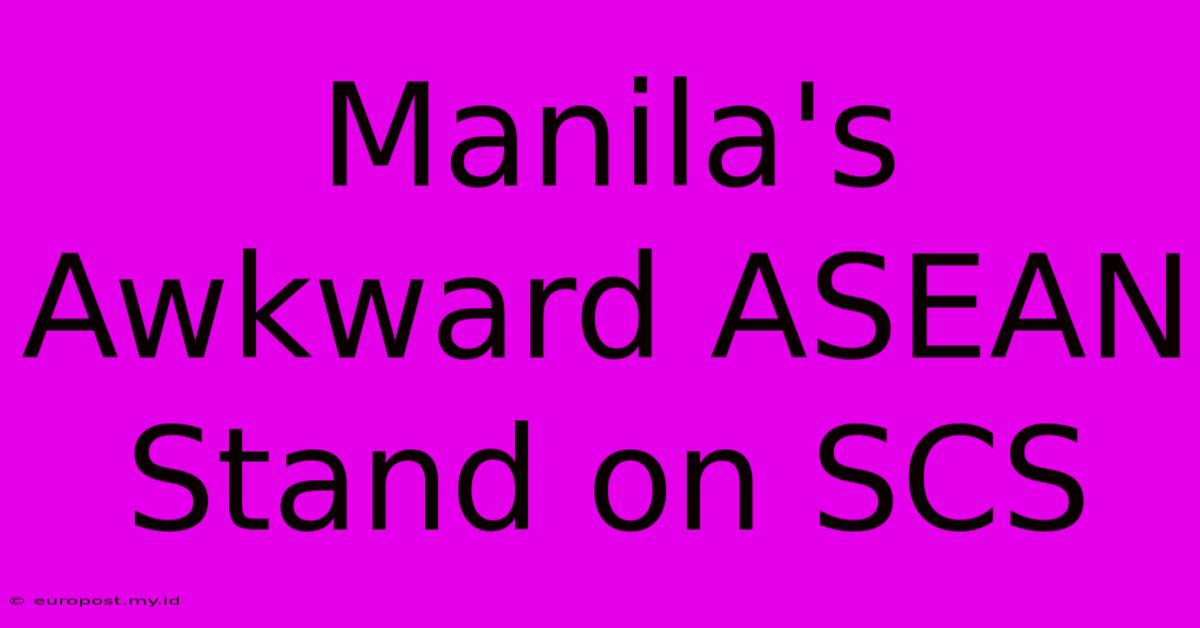Manila's Awkward ASEAN Stand On SCS

Discover more in-depth information on our site. Click the link below to dive deeper: Visit the Best Website meltwatermedia.ca. Make sure you don’t miss it!
Table of Contents
Manila's Awkward ASEAN Stand on the South China Sea
The South China Sea (SCS) dispute remains a persistent thorn in the side of Southeast Asian regional stability, and the Philippines, a key claimant, finds itself in an increasingly awkward position within the Association of Southeast Asian Nations (ASEAN). While Manila officially adheres to ASEAN's principle of consensus-based decision-making, its own national interests frequently clash with the bloc's often-reluctant approach to confronting China's assertive actions in the disputed waters. This article delves into the complexities of Manila's delicate balancing act, exploring the underlying factors contributing to its seemingly contradictory stance.
Navigating the Tightrope: Balancing National Interests with Regional Harmony
The Philippines' relationship with China is characterized by a delicate duality. Economically, China is a significant trading partner, offering lucrative investment opportunities and crucial access to markets. This economic interdependence significantly influences Manila's foreign policy, often leading to a cautious approach to criticizing Beijing's actions in the SCS. Public pronouncements often prioritize diplomatic engagement and de-escalation, even when faced with blatant violations of international law, such as the encroachment on Philippine-claimed territories.
However, this pragmatic approach contrasts sharply with the strong sentiments among the Filipino populace, who overwhelmingly view China's claims as illegitimate and a threat to national sovereignty. This disconnect between public opinion and official policy creates an internal tension that shapes Manila's behavior within ASEAN.
The ASEAN Consensus: A Double-Edged Sword
ASEAN's commitment to consensus-building, while designed to foster unity, often proves paralyzing when dealing with the SCS issue. China's economic clout and its strategic influence within the region often stifle any attempts to issue strong, unified condemnations of its actions. This necessitates a carefully worded approach that avoids direct confrontation, even when significant breaches of international law occur. For the Philippines, this means navigating a complex web of diplomatic niceties to balance its national interests with the need to maintain regional harmony within ASEAN.
The Limits of Diplomacy: When Words Fail to Deter
While diplomatic engagement remains a cornerstone of Philippine foreign policy towards China, its limitations are becoming increasingly apparent. Despite numerous diplomatic dialogues and pronouncements, China continues its assertive behavior in the SCS, consistently disregarding international rulings, such as the 2016 arbitral tribunal's decision which largely favored the Philippines. This highlights a crucial challenge: the effectiveness of diplomatic solutions in the face of a powerful actor unwilling to compromise.
The Way Forward: Charting a Course for the Philippines
Manila faces a complex challenge: securing its national interests in the SCS while maintaining its standing within ASEAN and managing its relationship with China. This requires a multi-faceted strategy that encompasses:
- Strengthening Bilateral Alliances: Fortifying strategic partnerships with countries like the United States, Japan, and Australia can provide crucial support for the Philippines in countering China's assertiveness.
- Promoting Multilateral Cooperation: Active participation in multilateral forums, beyond ASEAN, can amplify the Philippines' voice and garner international support for its claims.
- Prioritizing Domestic Preparedness: Investing in the modernization of its military and coast guard is crucial to safeguarding Philippine sovereignty in the disputed waters.
- Public Diplomacy: Maintaining open and transparent communication with the Filipino populace regarding the government's approach to the SCS issue can help bridge the gap between public sentiment and official policy.
The Philippines' position in the SCS dispute within ASEAN is a delicate and evolving one. Finding a balance between national interests, regional unity, and the complexities of its relationship with China remains a significant challenge for Manila. The success of its approach will depend on its ability to effectively utilize a blend of diplomatic engagement, strategic partnerships, and domestic capacity building. The path forward demands a nuanced strategy, and the world watches as the Philippines attempts to navigate this intricate geopolitical landscape.

Thank you for taking the time to explore our website Manila's Awkward ASEAN Stand On SCS. We hope you find the information useful. Feel free to contact us for any questions, and don’t forget to bookmark us for future visits!
We truly appreciate your visit to explore more about Manila's Awkward ASEAN Stand On SCS. Let us know if you need further assistance. Be sure to bookmark this site and visit us again soon!
Featured Posts
-
Nayanthara Opens Up Dhanushs Dislike
Nov 16, 2024
-
2024 Nba Cup Warriors Grizzlies Prediction
Nov 16, 2024
-
Cristianos New Record Ex Real Madrid
Nov 16, 2024
-
Real Recognizes Real Ali On Tyson
Nov 16, 2024
-
Moto Gp Barcelona Pole Position For Bagnaia
Nov 16, 2024
